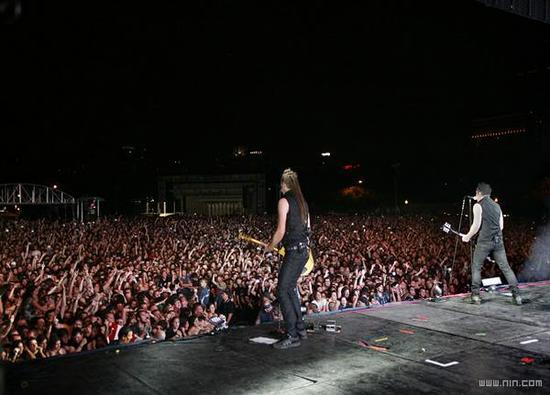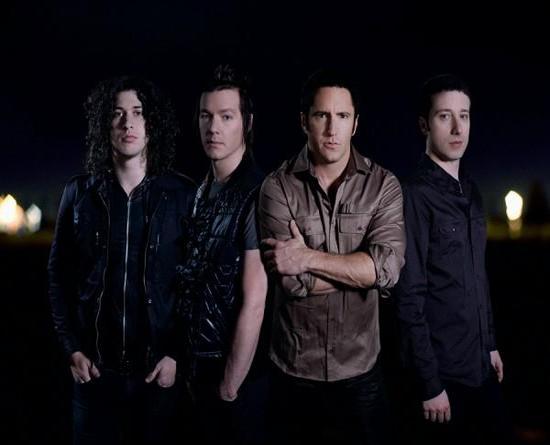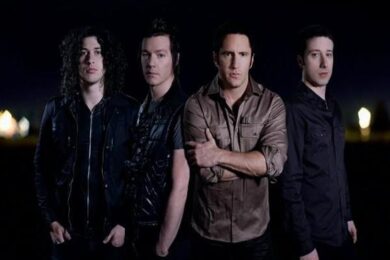The O2 is like every corporate-dystopian film I’ve ever seen: there’s a maze of checkpoints and queues and special fast-track queues to queue some more. I wanted to see Nine Inch Nails rock the place until their jackhammer synth-bass assault and strobe warfare rent the tarp-stretched ceiling and deflated it like the pus-filled boil it is, crushing the airport-lounge chain brasseries and sending the giant (as in, bigger than the actual stage) Girls Aloud billboard for Diet Kit-Kats crashing from the walls and crumbling into rubble like the ruins of some Babylonian temple that pissed off the gods with its rapacious ostentation.
This didn’t actually happen, because stadium rock shows are about crushing all but the mightiest into cheese-coated husks of irrelevance. It’s hard to take much music, even music you love, seriously when you’re watching it on a stage so far away it looks like a postage stamp, next to some dude eating squeeze-pump nachos. The stadium effect withered support band Jane’s Addiction, with their stage backdrop of silhouetted pole-dancers, their smoke and Perry Farrell’s blinding mirror-sequin trousers. But for the scale, they could have been a Doors tribute band shouting out, "We love this town!" If you’d heard about Perry Farrell’s 90s heyday — Spin covers every other month! Lollapalooza storming the outdoor stadium circuit in the US, previously turf of the Dead and Phish! Pied piper of a body-art MTV alternative nation! — and then seen them here for the first time, you’d never have believed it.
Nine Inch Nails, though — they can ride this beast and slaughter it. It’s because NIN songs, for all their rage, are ambivalent, not triumphalist. They are songs about fighting to the death to protect whatever shreds of dignity and love and self-determination anyone can hang onto as late capitalism chomps through everything worth living for. So for NIN to play in the middle of this corporate hellmouth is almost the perfect setting. Looking up from the floor, the ticker-light ads for Miley Cyrus and American Idol tours circling the room are dizzying and insulting in their assumption that these are things everybody must like. It’s proof that, yes, all the frustration and persecution is real, and the jackbooted powers that be are dancing on the backs of the bruised.
Who honestly likes stadiums? They’re worse than a Saturday trek to Ikea. They’re both a hulking and clumsy hangover of last century’s one-size-fits all mass media (the herd! The mass! The lonely crowd!) and in these wonderful days of web-led audience splintering, negative promo budgets and long tailism, they’re getting to be one of two options for seeing gigs. As mid-size venues are culled, you’re increasingly stuck with either the hyperbranded big box with its oxygen-deprivation seating and pathways for golf carts, or the local toilet.
Artists, too, are tracked one way or the other from the start of their careers. Interestingly, Trent Reznor has written an essay offering step-by-step advice about how to make it as a musician in the age of Free.
You’ve got to give the guy credit for his concern. Reznor is a smart and decent fellow who’s aware that he’s one of the last rock brands formed when marketing budgets existed, when fake-indie labels like Interscope were tacked onto majors, when there were several levels of distribution that it was possible to scale through at different points of a career. There was a tiny bit more room for A & R miscalculations. Now that we’re in an age of downloads and realtime metrics of sales and press and opinion data, investors are nervous, and that wiggle room for the non-superstar sellers is gone.
Part of Reznor’s advice to novices is to decide as soon as possible if they want to be stadium-fillers or not. If not, then they need to give away their songs as high-quality MP3s while selling versions of those songs with added fan-value: handwritten notes, cool packaging, whatever, something personalized, in exchange for fans’ details. This kind of clever marketing is supposed to save those artists who won’t be playing Wembley in six months’ time. But will it? After all, this personal touch is exactly what Trent gives away for free, by blogging and letting fans in on mixable tracks, early downloads and so on.
It’s as if all the social media stuff new bands (as well as writers, artists and anyone who has to tout for their next freelance post) are expected to do has to take over from the work it’s meant to support and promote. Every job is an American-style service industry job now, and you have to say ‘have a nice day’ and tap-dance and grin to build ‘relationships’, or at least to build your database, to constantly catch the attention of the people who throw paid jobs and status like fish to trained seals. Are they aware that you too can jump through hoops and ring bells and do backflips in five daily updates? What if you don’t give a fuck? What if you just want to make music and stuff?
Well, as Reznor says, following Chris Anderson, stuff’s Free, and, "This is a fact — it sucks as the musician BUT THAT’S THE WAY IT IS (for now)."
So why does Trent Reznor do any of it, then? He doesn’t need NIN.com to make money. The elaborate design of the site, like the O2 queues, might even be part of the problem. Some fans prefer minimal website design as long as it’s personal and navigable. I talked to an unscientifically small sample of fans about their thoughts on the site and Reznor’s involvement. They were not impressed. "I used to go on the website, back in the beginning, when it wasn’t written by other people," one fan, who was a games designer, told me. He then described how, in games, the golden rule was to achieve your goal in fewer than seven clicks. NIN.com, he said, was too complicated.

Two women told me that they had problems getting in to the O2, even though they’d booked their tickets from NIN.com — there was a longer queue to collect tickets out front for people who had done so. One of them told me that she and her boyfriend liked the site because of the downloadable, remixable songs that they were able to play with — but she was also annoyed that the tickets were only available for pickup at the O2, because, like most people, she had to work and getting through the queue bottleneck meant missing the opening acts.
So Reznor is in a strange position. How can you give your fans a level of personal attention and respect and still pack stadiums? Because, let’s face it, apart from scoring adverts, there aren’t many other ways to make real money from music right now. Perhaps NIN.com and social stuff are just bad marketing because they don’t have to be good, and who has the time to respond to millions of tweets and run usability panels? After 20 years of consistently passive-aggressive defeatist rock that really hits those sweet spots where weakness and self-loathing meet ego and rage, surely those sales are a foregone conclusion?
Conversely, if you really want to reach out to fans and offer your advice, why keep stomping around shouting "Hello Cleveland!" or whatever for weeks on end to crowds whose love shifts from something personal, conversational and interactive to something anonymous and transactional, like the data impulses that send money between cash machines? How does that feel, after a while? Even if you do have unlimited time to do all this social stuff yourself, at a certain point, doesn’t that get equally draining? This may be why this is NIN’s last big tour. After this gig, according to Pitchfork, Reznor shut down his Twitter account for good.
The consensus among the fans I talked to seemed to be that they didn’t care that much about the site anyway, it was the show that mattered, and while they’d all have rather seen NIN at a smaller venue like Brixton Academy, they were willing to put up with certain indignities because NIN were known for their amazing live shows, and this was the last tour, maybe ever.
And NIN delivered, playing songs from every album, every phase of their career. Gary Numan, who NIN supported on their first UK tour, 20 years ago, came on mid-set to play ‘Metal’ and ‘Cars’. Even the lighting design flummoxed the everpresent adverts by attacking the audience with shifts from the smallest spots in near-blackout to a barrage of strobes. This built up to a climax where the whole floor was thrashing away to ‘Head Like a Hole’ before the set closed with a stripped-down ‘Hurt’ in all its raw ambivalence. It was the best kind of stadium show possible: thousands of people as publicly excited about this stuff as they would be, alone, in their cars or bedrooms or in front of their computer screens. But part of it was because somewhere, all of us, on stage or selling cheesy nachos (or on that billboard selling Diet Kit-Kats) have to bow down before the ones we serve, we all have to perform, all the time.



